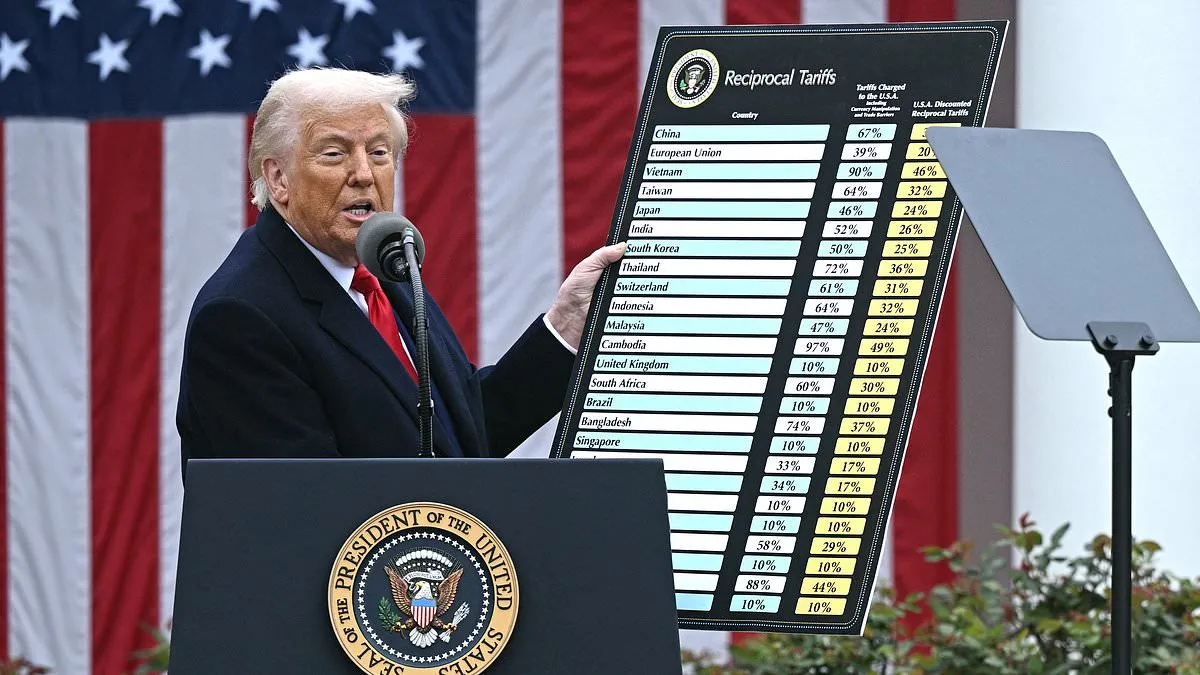
In recent weeks, numerous companies have begun to react to President Donald Trump's tariffs by implementing surcharges on their online shopping carts. This strategic move makes it abundantly clear who they believe is responsible for the increased costs. To avoid alienating potential customers by directly associating these fees with Trump's name, some businesses have opted for the more neutral term, 'tariff surcharge.' However, others are boldly facing the backlash from MAGA supporters by explicitly naming the surcharge after the President.
One notable example is Jolie, a New York-based skincare brand renowned for its innovative showerhead filters. Starting next week, Jolie will introduce a 'Trump liberation tariff' fee at checkout for all orders. Ryan Babenzien, the founder and CEO of Jolie, stated, 'We think transparency is the way to go here and I am giving Trump full credit for his decision to add this tariff to all US consumers.' He emphasized that although they are not raising prices, the tariff will inevitably make it more expensive for American consumers to purchase Jolie products.
Babenzien further explained to Bloomberg that he is still determining the exact surcharge that will apply on top of the cost of a $150 showerhead. Jarrad Berman, a partner at a New York private equity firm, highlighted that such surcharges appeal particularly to small businesses, especially those selling items in low quantities. He noted that most customers typically tolerate a fee of less than $10, adding, 'Everyone is discussing tariff surcharges; it's just not one size fits all.'
Another company making headlines is Dame, a sexual wellness brand that manufactures sex toys. They have introduced a $5 'Trump tariff surcharge' on all vibrators imported from China, complete with an image of Trump's distinctive hairstyle. Despite the White House recently pausing reciprocal tariffs on numerous nations for three months, the ongoing trade war with China continues to affect many businesses. Effective tariffs on Chinese imports now stand at 145%, while China has retaliated with 125% levies on US goods.
Dame CEO Alexandra Fine explained to CNBC that the $5 surcharge does not cover the full cost of manufacturing, but serves as a signal that businesses like hers are negatively impacted by these tariffs. In an Instagram post, Dame stated, 'We're adding $5 for now—which doesn't cover the full cost as we hate to put the brunt of this on you—while we figure out what to do next.' Fine also mentioned ongoing negotiations with manufacturers and adjustments to their logistics and inventory.
Labucq, a company specializing in high-end shoes made in Italy, announced that the 20% US tariff on imports from the European Union would necessitate a 10% price increase effective April 15. Although Labucq has not commented on the recent pause of EU reciprocal tariffs, they indicated another 10% price hike would occur on May 7 to maintain sustainability.
Even larger corporations are feeling the pressure to adapt in this tariff-heavy trade environment. Honeywell Building Automation, which designs safety systems for buildings, initiated a 6.4% surcharge on all building management systems in early March, excluding software and subscription services. This decision was a direct response to Trump's tariffs, affecting not only China but also Canada and Mexico, who currently benefit from a carveout under the USMCA trade deal. Honeywell has committed to removing the surcharge once the tariffs are lifted.
Some firms are attempting to leverage the temporary pause on tariffs by promoting limited-time sales that encourage consumers to lock in 'pre-tariff' prices. Denish Shah, a marketing professor at Georgia State University's Robinson College of Business, explained that tariffs create uncertainty in the marketplace, prompting consumers to overestimate potential losses and react strongly to sales. He noted that consumers tend to be very price-sensitive, particularly in these uncertain times.
An example of this strategy is Burlap & Barrel, a company that imports spices from around the globe. They recently announced a 'spring cleaning-turned-impromptu Tariff sale,' offering a 20% discount on all products. In an Instagram post, the company remarked, 'When we planned this sale, we thought it'd be a routine springtime promotion, but in the last few days it has turned into something very, very different. We can already see that the new tariffs will be bad for our business. How bad remains to be seen.'
Additionally, Freewrite, a company selling digital typewriters, has reached out to customers urging them to purchase before impending price increases on their China-made products. CEO Adam Leeb stated, 'On Monday, we will be raising prices. Not because we want to, but because we have to.'